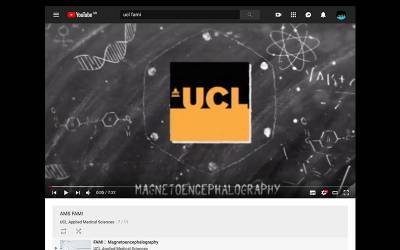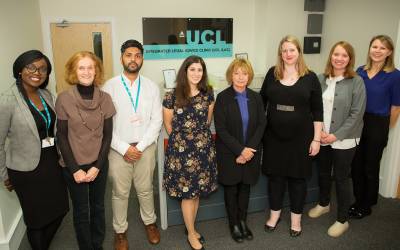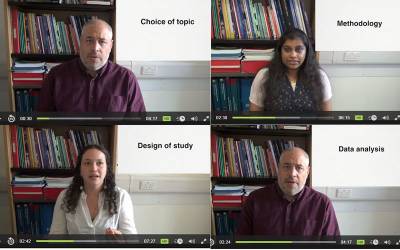We want our students to benefit from being part of our world class research community.
Through the Connected Curriculum, our framework for research-based education, we seek to offer every student the opportunity to carry out research, at every level of study, challenging them to develop independent, critical thinking, as well as the skills they need for their future careers, so that they leave us inspired and ready to take on big challenges.
Professor Anthony Smith, UCL Vice-Provost (Education & Student Affairs)
Case study: Novel assessment helps students develop a range of skills
Innovative assessment methods have improved student satisfaction and led to new assessment approaches across the entire Applied Medical Sciences degree programme.
Students on the first-year Functional Anatomy and Medical Imaging module were challenged to create a video documentary, no more than seven minutes in length, about a new imaging technique of their choice and its applicability for the study of human anatomy. As part of the project, students were encouraged to interview UCL researchers and share their findings via YouTube.
The project developed a range of skills, including researching and synthesizing complex information, presentation skills and public engagement skills. The experience of interviewing leading scientists was exciting and inspirational for the students, leading not only to increased student satisfaction, but also to improved educational outcomes, with the students attaining significantly higher marks than previous cohorts.
The success of this project has led to a re-think of the assessment approach across the entire programme, with coursework replacing short answer examinations. Activities covering a range of outputs from the traditional (e.g. poster presentations) to electronic outputs such as blogs, podcasts and YouTube videos.
Image: Screenshot from student-produced video
Links: UCL Applied Medical Sciences
Case study: Helping vulnerable residents with legal advice
A free legal clinic run by UCL is helping vulnerable residents in East London, while also providing valuable professional experience for UCL students.
The UCL Integrated Legal Advice Clinic (iLAC) in Stratford is run by the Centre for Access to Justice at the UCL Faculty of Laws. It offers local residents free general legal advice on various aspects of social welfare law, including benefits and housing, and was recently awarded a legal aid contract in the categories of housing law and community care law.
The clinic is staffed by UCL law students working under the close supervision of qualified lawyers and advisers, offering students a rich educational opportunity while also serving the local community. Since the formation of the clinic in January 2016, it has successfully helped clients with a range of issues. Students and advisers have helped severely disabled clients to apply for the welfare benefits they were entitled to and have represented others in welfare benefits tribunals to appeal incorrect decisions.
Additionally, specialist housing advice from iLAC has helped to rehome young single mothers whose accommodation was in such disrepair that it was severely affecting their children’s health, saved several clients from being evicted and ensured that the Council fulfilled its duty to place homeless pensioners in assisted housing.
Image: The Integrated Legal Advice Clinic team at the launch of their new, dedicated community space in Stratford in 2018. Image credit: Robert Chadwick
Links: UCL Laws / Centre for Access to Justice / Integrated Legal Aid Advice Clinic
Case study: Alumni experiences help postgraduate students
Students in the UCL Institute of Education (IOE) can now get inspiration and advice from recent alumni, thanks to a collaborative project involving current students, alumni and staff in the Department of Curriculum, Pedagogy and Assessment.
The leaders of three Master’s programmes (Mathematics MA, Geography MA and Science Education MA) were seeking ways to support students choosing their dissertation topics. After attending a Connected Curriculum innovation meeting, they developed the project in collaboration with the Student Academic Representatives.
Students writing dissertations on the three programmes were asked for feedback about their experience and what kind of support they could have benefited from when researching and choosing their dissertation topics. Advice and input from those who had already completed their dissertations – ie alumni – was frequently mentioned.
Student reps held focus groups with fellow students to get an idea of what kind of insights would be most helpful. They then invited 12 alumni from the three programmes, all of whom had graduated in the last 4 years, to take part in the project. The alumni were invited to the IOE to record short videos for the students, sharing their advice in the form of interviews.
The project met with an enthusiastic response, with the videos being watched by most of the current cohort. The videos are now a useful resource that can be accessed from anywhere in the world, and the department is already seeking feedback to improve them even further.
Image: IOE alumni videos
Links:
UCL IOE /
Department of Curriculum, Pedagogy and Assessment
Further information
 Close
Close




